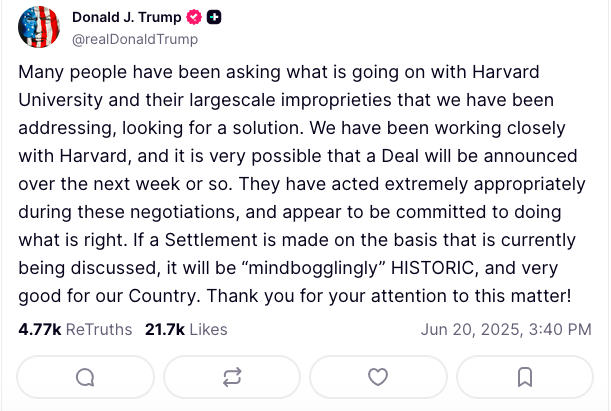August 11, 2025
Trump Administration Intensifies Pressure on Harvard Over Patent Rights Amid Negotiation Stalemate

In a bold move that escalates ongoing tensions, the U.S. Department of Commerce threatened on Friday to seize intellectual property from Harvard University. This aggressive step is purportedly in response to the Ivy League school's alleged non-compliance with the Bayh-Dole Act concerning federally funded research. The announcement has raised eyebrows across academic and legal communities, spotlighting a deepening conflict between the Trump administration and one of the nation's leading educational institutions.
The threat to invoke the government’s march-in rights—a measure allowing federal intervention on patents to ensure public access to scientific innovations—was announced amidst strained negotiations over other contentious issues, including federal funding and policies affecting international students. This comes on the heels of a series of critical posts by President Trump on Truth Social, hinting at a nearing but unmaterialized agreement with Harvard.
The administration's move has been criticized as a negotiation tactic meant to pressure Harvard into concessions. Comments from a Twitter post by Howard Lutnick, a notable figure in the debate, underscore the government's stance: “Taxpayers deserve the benefit of the bargain. If Harvard won’t honor the Bayh-Dole Act, then we will find someone who will.”
Harvard responded swiftly and robustly, defending its track record and commitment to public benefit. "This unprecedented action is yet another retaliatory effort targeting Harvard for defending its rights and freedom," stated a Harvard spokesperson to Law360. They further emphasized the value of their research outputs, describing them as "life-saving and industry-redefining," and affirmed their dedication to compliance with all legal obligations under the Bayh-Dole Act.
This confrontation is not isolated but part of a broader pattern of challenges directed at Harvard by the Trump administration, which includes disputes over the university's efforts to combat antisemitism and its management of federal funds. Each development in this unfolding story brings significant implications for the landscape of academic research and the handling of intellectual property rights in the United States.
As the situation develops, the academic world watches closely, understanding that the outcomes could reshape the interaction between educational institutions and government agencies concerning research advancements and intellectual property.